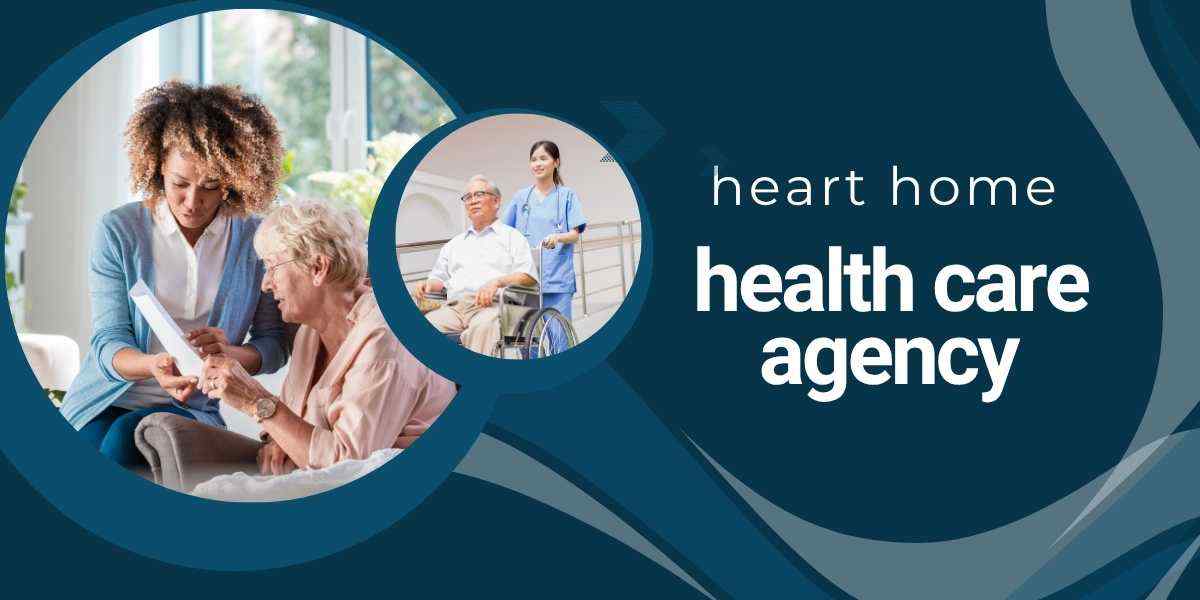Heart Home Health Care Agency: Looking for trusted, professional home health care in the United States? Discover how Heart Home Health Care Agency provides expert medical services with a compassionate touch in 2025. Learn about services, benefits, cost, and more.
Introduction: Why Home Health Care Matters in 2025
In 2025, the healthcare landscape in the United States is rapidly shifting towards personalized, in-home services — especially for aging adults, patients with chronic illnesses, and those recovering from surgeries. The traditional hospital setting, though effective, can often be overwhelming, costly, and less personal.
That’s where Heart Home Health Care Agency steps in.
Providing professional, compassionate care in the comfort of your home, Heart Home Health Care Agency is one of the top-rated home care providers across the United States. Whether it’s post-operative care, elderly assistance, or daily nursing support, this agency is committed to treating patients not just as cases — but as family.
Table of Contents
- What is Heart Home Health Care Agency?
- Why Choose In-Home Health Care in the U.S.?
- Core Services Offered
- Specialty Programs
- How It Works: From Consultation to Care
- Who Are the Care Providers?
- Why Families Across the U.S. Choose Heart
- State-by-State Coverage (Top Cities)
- Technology in Home Health (2025 Trends)
- Comparing In-Home Care vs Nursing Homes
- Cost Breakdown & Insurance Coverage
- Real Stories: Testimonials & Case Studies
- How to Choose the Right Home Health Agency
- Red Flags to Avoid in the Industry
- Frequently Asked Questions (FAQs)
- Final Thoughts: Caring from the Heart

What is Heart Home Health Care Agency?
Heart Home Health Care Agency is a licensed U.S.-based provider that delivers skilled medical and non-medical services directly to patients’ homes. Its goal is to promote independence, support recovery, and ensure comfort for individuals who cannot or prefer not to receive care in a hospital or facility.
Founded on values of compassion, dignity, and professionalism, this agency has grown to serve multiple states and thousands of families nationwide.
Why Choose In-Home Health Care in the U.S.?
🌟 Benefits at a Glance:
- Comfort of familiar surroundings
- Personalized one-on-one attention
- Lower exposure to hospital infections
- Emotional stability for patients and families
- Affordable alternative to institutional care
As America’s population ages — with over 70 million people aged 65+ projected by 2030 — the demand for trusted home health services has skyrocketed. Heart Home Health Care Agency meets this demand with integrity and expertise.
Core Services Offered
Heart Home Health Care Agency offers a broad spectrum of services, including:
Skilled Nursing:
- Post-surgical care
- IV therapy
- Medication management
- Wound care
- Catheter maintenance
Therapy Services:
- Physical Therapy
- Occupational Therapy
- Speech Therapy
Personal Care Assistance:
- Bathing, dressing, grooming
- Mobility support
- Toileting and incontinence care
Daily Living Help:
- Meal prep and feeding
- Medication reminders
- Light housekeeping
- Transportation
Care Coordination:
- Doctor’s appointments
- Health monitoring
- Family education and updates
Specialty Programs
Heart Home Health Care Agency goes beyond standard care with specialty programs such as:
- Alzheimer’s and Dementia Support
- Palliative and End-of-Life Care
- Chronic Disease Management (Diabetes, COPD, CHF)
- Stroke Recovery
- Post-Hospital Discharge Programs
- Fall Prevention Assessments
- Home Safety Evaluations
How It Works: From Consultation to Care
Step-by-Step Process:
- Initial Assessment: Free consultation by a registered nurse or care coordinator.
- Personalized Plan: Development of a care plan based on patient needs.
- Caregiver Matching: Based on experience, language, and personality fit.
- Regular Monitoring: Ongoing assessments and updates.
- 24/7 Support: On-call staff available day and night.
Who Are the Care Providers?
Heart Home Health Care Agency staffs only qualified, licensed, and background-checked professionals, including:
- Registered Nurses (RNs)
- Licensed Practical Nurses (LPNs)
- Certified Nursing Assistants (CNAs)
- Home Health Aides (HHAs)
- Physical/Occupational/Speech Therapists
Each caregiver is selected not only for clinical competence, but also for empathy and reliability.
Why Families Across the U.S. Choose Heart
Here’s what makes Heart stand out:
- 🩷 10+ Years of Excellence
- 🌍 Serving Over 20 States
- 🕒 24/7 Availability
- 🧾 Flexible Payment Options
- 📱 Easy-to-Use Client Portal
- 👨👩👧 Family Integration in Care
State-by-State Coverage (Top Cities)
While services vary by region, Heart Home Health Care Agency currently operates in:
- California: Los Angeles, San Diego, San Francisco
- Texas: Houston, Dallas, Austin
- Florida: Miami, Orlando, Tampa
- New York: NYC, Buffalo, Albany
- Illinois: Chicago, Naperville
- Georgia: Atlanta, Savannah
- Pennsylvania: Philadelphia, Pittsburgh
- Arizona: Phoenix, Tucson
- And more…
Technology in Home Health (2025 Trends)
Heart Home Health Care is leading the innovation curve:
- 📡 Remote Patient Monitoring
- 📲 Digital Health Portals for Families
- 🎙️ Voice-Assisted Reminders
- 🔔 Emergency Alert Devices
- 🤖 AI-Powered Care Scheduling
- 🧠 Cognitive Tracking Tools
This ensures patients stay safe, connected, and informed.
Comparing In-Home Care vs Nursing Homes
| Feature | In-Home Care | Nursing Home |
| Environment | Familiar Home | Facility |
| Cost | Often Lower | Higher |
| Personalized Attention | High | Varies |
| Infection Risk | Low | Higher |
| Independence | Preserved | Limited |
Cost Breakdown & Insurance Coverage

Average Cost:
- Hourly Rate: $25–$45
- Daily Visit (RN): $150–$250
- 24-Hour Care: $300–$500/day
Insurance Accepted:
- Medicare / Medicaid
- VA Benefits
- Private Health Insurance
- Long-Term Care Insurance
- Private Pay with Flexible Options
Real Stories: Testimonials & Case Studies
“My mother suffered a stroke last year. Heart Home Health Care was a blessing — they provided therapy, nursing, and personal care right at home. She regained mobility in 3 months.”
— Angela P., Atlanta, GA
“Their caregivers feel like family. My dad’s Alzheimer’s journey has been smoother because of them.”
— James L., Los Angeles, CA
How to Choose the Right Home Health Agency
✅ Check Licensing
✅ Ask About Staff Credentials
✅ Look for Accreditation (e.g., CHAP, JCAHO)
✅ Verify Insurance Coverage
✅ Ask for References
✅ Evaluate the Care Plan Process
✅ Prioritize Communication
Red Flags to Avoid in the Industry
🚫 Vague or generic care plans
🚫 No background checks on caregivers
🚫 Poor reviews or BBB complaints
🚫 No medical oversight
🚫 Lack of transparency in billing
Frequently Asked Questions (FAQs)
Q1: Is Heart Home Health Care Agency Medicare-certified?
A: Yes, it is fully licensed and Medicare-approved across multiple states.
Q2: Can I choose my own caregiver?
A: Yes, patients can request a specific gender, language, or experience background.
Q3: How quickly can services start?
A: Usually within 24 to 72 hours of consultation.
Q4: What if I need care at night or on weekends?
A: 24/7 support is available including holidays and weekends.
Q5: Do they provide pediatric care?
A: Yes, specialized pediatric services are available in select locations.
Q6: Advanced Technologies in Home Care?
A: Advanced technologies in home care are transforming how healthcare services are delivered to patients in the comfort of their homes. These innovations are particularly valuable for elderly individuals, people with chronic illnesses, and those recovering from surgery. Here’s a breakdown of the most impactful advanced technologies in home care today:
Remote Patient Monitoring (RPM)
What it is: RPM uses digital technologies to collect medical and health data from individuals in one location and electronically transmit that information securely to healthcare providers.
Examples:
-
Wearable devices that track heart rate, blood pressure, glucose levels
-
Smart thermometers and oximeters
-
Scales that monitor weight changes (especially for heart failure patients)
Benefits:
-
Early detection of potential health issues
-
Reduced hospital readmissions
-
Continuous care without constant clinic visits
-
Telehealth and Telemedicine
What it is: These services allow patients to consult with healthcare professionals via video conferencing, phone calls, or mobile apps.
Examples:
-
Virtual doctor visits
-
Mental health therapy via video
-
Medication management consultations
Benefits:
-
Increases access to care for rural or immobile patients
-
Reduces transportation and waiting room times
-
Convenient and cost-effective
Smart Home Integration
What it is: Smart home devices are used to enhance safety, mobility, and independence for patients at home.
Examples:
-
Voice assistants (like Alexa or Google Home) to set medication reminders
-
Automated lighting and fall-detection sensors
-
Smart doorbells and locks for caregiver access
Benefits:
-
Improves daily living safety
-
Enhances quality of life and independence
-
Provides peace of mind to family members
AI-Powered Predictive Analytics
What it is: Artificial intelligence analyzes data to predict potential health risks and recommend interventions.
Examples:
-
AI algorithms that predict risk of falls or hospital readmission
-
Machine learning models for medication adherence and behavior changes
Benefits:
-
Proactive instead of reactive care
-
Helps providers make data-driven decisions
-
Improves outcomes for chronic care management
Mobile Health (mHealth) Apps
What it is: Apps on smartphones and tablets that support health monitoring and communication with providers.
Examples:
-
Daily health check-in apps
-
Apps for medication reminders and tracking
-
Care coordination platforms for caregivers and patients
Benefits:
-
Empowers patients to manage their health
-
Improves adherence to treatment plans
-
Enhances patient-provider communication
Robotics and Assistive Devices
What it is: Technology that assists with physical tasks or monitors patient conditions.
Examples:
-
Robotic exoskeletons for rehabilitation
-
Assistive feeding robots or mobility aids
-
Companion robots for emotional support
Benefits:
-
Promotes independence in daily activities
-
Supports rehabilitation at home
-
Reduces caregiver burden
Electronic Health Records (EHRs) and Interoperability
What it is: Digital records that allow seamless communication and data sharing among healthcare providers.
Examples:
-
Shared access to patient records for home care nurses, doctors, and specialists
-
Integration with remote monitoring tools and mobile apps
Benefits:
-
Better care coordination
-
Reduces medical errors
-
Saves time and avoids duplicate procedures
Medication Dispensing Technologies
What it is: Devices that automate medication management and dispensing.
Examples:
-
Smart pill dispensers with alarms
-
Locked dispensers that release medication at set times
-
Monitoring systems that alert caregivers if a dose is missed
Benefits:
-
Enhances medication adherence
-
Reduces risk of overdose or missed doses
-
Helps patients with memory issues
Virtual Reality (VR) and Augmented Reality (AR)
What it is: VR and AR technologies are used for therapy, education, and patient engagement.
Examples:
-
VR exercises for stroke or trauma rehabilitation
-
AR for caregiver training or home safety assessments
Benefits:
-
Engaging and effective rehab therapy
-
Enhances training for non-medical caregivers
-
Helps manage cognitive decline in dementia patients
Blockchain in Home Healthcare
What it is: A secure, decentralized way to manage and share medical data.
Examples:
-
Blockchain-based systems to track consent, prescriptions, and care records
-
Secure data exchange between providers, insurers, and caregivers
Benefits:
-
Improved data security
-
Reduces administrative costs
-
Ensures data integrity and privacy
Final Thoughts: Caring from the Heart
In 2025 and beyond, compassionate and professional care at home is not a luxury — it’s a necessity. Whether you’re planning ahead for a loved one or in urgent need, Heart Home Health Care Agency is here to deliver more than care — they deliver peace of mind.
Their dedicated professionals, flexible plans, and nationwide support make them a top choice in the U.S. for in-home health care.
Make the right choice for your family — choose care from the heart.
